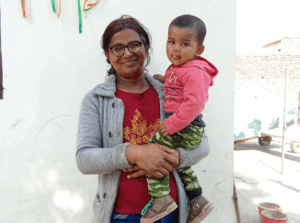Education
WEBINAR: Early Lessons For Education & Schooling During COVID-19 Crisis
ScooNews conducted a webinar on Zoom & FB Live with Dr. Ger Graus (Panel Chair), Dr. Mary Ashun, Jose Papa, Dr. Swati Popat Vats & Dr. Arunabh Singh
Published
5 years agoon
By
Rahul Sharma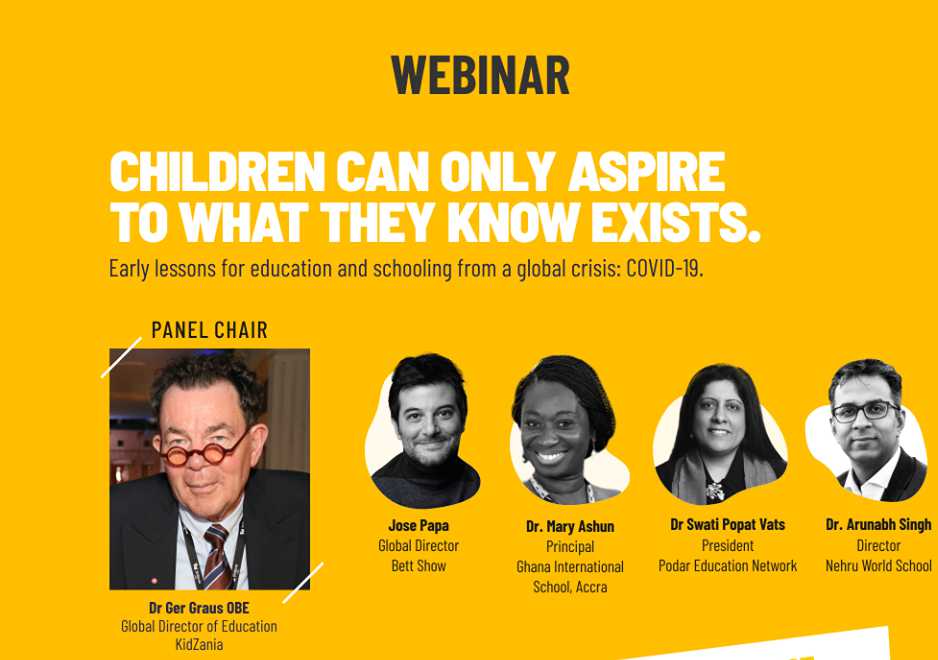
On 9th April 2020, ScooNews conducted yet another informative webinar on “Early Lessons For Education And Schooling From A Global Crisis: COVID-19, addressing the challenges that the COVID-19 pandemic puts on the education sector and how it can be tackled. The Live session was attended by more than 10,000 educationists.
The webinar was hosted by our guest panellist Dr. Ger Graus OBE, Global Director of Education, KidZania. Other panellists included Jose Papa, Global Director, Bett Show, Dr. Mary Ashun, Principal, Ghana International School, Accra, Dr. Swati Popat Vats, President, Podar Education Network and Dr. Anurabh Singh, Director, Nehru World School.
The webinar begins with an address by Dr. Graus who cherished being surrounded by other wonderful panellists to discuss the issue. “Friendship is better than normal ships and it is really true that we can’t do any of these things on our own,” he says.
He then proceeds to a presentation discussing the challenges that the Corona pandemic has brought and also the optimism that follows. Dr. Graus brilliantly narrates how the pandemic has led us into introspection about the online and offline living. He gives a personal account of himself and his family, who miss the offline social life during the lockdown.
Dr. Graus also explores the silver linings emerging out of the pandemic as teachers will be more appreciated by both parents and students.
He makes the audience understand the distinction between schooling and educating our children by giving the example of Barcelona Football Club’s motto ‘mes que una club’ that means ‘more than a club.’ In his opinion, the primary schools should also adopt a motto on similar lines ‘more than a school’.
Dr. Graus acknowledges the importance of school and calls it the heart of our community rather than just a building to produce grades. “In the future, the role and importance of schools at the heart of the community needs reexamination both on and offline and the outcomes needed to be acted on urgently,” he says.
The importance of ‘access’ is also discussed by Dr. Graus and he puts great emphasis on how the lack of access to educational resources both online and offline is widening the social gap.
He concludes the presentation by giving some valuable advice on education and how adults should make children comfortable and feel safe and secure. He guides, “Please remember who you are and not what you are. It will bring out the best in people.”
Dr. Grass then invites Dr. Mary Ashun, Principal, Ghana International School, Accra, to share her views about the ongoing situation.
“We are all unified for one purpose, we want what is best for our children,” remarks Dr. Ashun. She talks about how we need to connect in order to keep education great for children.
She gives an overview of the Ghana International School situated in Accra and shares a wonderful story about how one of his teachers gifted her a painting of a ship on turbulent water that resembles the current situation of her school and how the teachers are praying for her to steer the ship well.
Dr Ashun shares her struggle during the lockdown both on the professional and personal front. She talks about the stress she is facing in keeping things from falling apart. According to her, parent, teachers, and administrators are facing the same kind of stress and they need to understand each other to keep things afloat.
“I want a school standing when we are ready to go back to school. That is critical for me and the people who will keep the school going are the teachers. They are my assets and I have to make sure that they don’t fall apart,” she reaffirms.
She says that social distancing has affected her as the culture in Ghana has always been outgoing. She adds how she is striving hard to please all the stakeholders even if sometimes it seems impossible.
The next speaker was Dr. Anurabh Singh, Director, Nehru World School, who continues the session with an astounding thought – “For 42 years, students have been coming to the school to study and it all stopped three weeks back!”
He shares his experience that how all the professional development of teachers so far has been for the betterment of traditional classrooms and not for online teaching. In the current situation when teachers are expected to conduct online classes, it’d become stressful for them as the students are better at technology than the teachers. According to him, teachers will have to understand and tackle the fact in a way so they emerge as the ones who have the ultimate power to guide the session.
He admits that another challenge for teachers is to make their students connect with them and their classmates during the online classes. He acknowledges the importance of access to data in these times with a hope that the government will realize how important it is for us to stay connected.
He ends his session with the note that 'this event will ‘change our DNAs forever and we will be better prepared next time.’
The discussion then moves on to Jose Papa, Global Director, Bett Show. Mr. Papa begins with acknowledging the special opportunity and sending out a message of optimism on how this chaos has brought us together and given us a chance to transform the world for better.
Being an expert from the Ed Tech field, he shares that no matter how challenging this time is for the companies, it’s also a great opportunity to reset the old way of working and lay the foundation of future by endorsing digital platforms as the way of the future.
“Technology is going to be the fundamental way of how we are going to interact with each other and how we’re setting the cornerstone of the future through the use of technology now,” he assures.
He informs that this the right time to acknowledge the importance of technology in education and that’s exactly what BETT is doing by grabbing the opportunity to align technology with education as never before.
He then goes on to talk about the importance of active access to technology to all level of society and the importance of working with national governments to formulate policies for the same. “The current crisis has renovated our purpose,” he adds.
The next speaker was Dr. Swati Popat Vats, President, Podar Education Network, who begins by acknowledging the importance of BETT in making technology education-friendly and introducing us to the unique ideas from around the globe.
She expresses the concern about how difficult it is for the Early Childhood community to go online as children thrive for human touch and presence.
Since Podar Education Network has many preschools in remote areas where the access to proper internet connection is a challenge, she says the administration is trying all possible media to keep the connection active. “We are trying to ensure that the children see their teachers every day Live because that is the most important thing,” she remarks. She adds that for now Google Hangout, WhatsApp video calling and teacher’s personal cameras are being used to deal with the situation.
She talks about their two schools in Dubai that are now closed until June, unlike those in India because here the parents are comparatively open when it comes to online home-based learning, that’s putting more emphasis on skill development at the moment.
“We are advising the parents to talk in a positive way to their kids and show them resilience as this is the stage where they imitate adults,” she advises.
Dr. Vats shares that her team has received a large number of photographs and videos from parents establishing the fact that the initiative was an instant success.
She concludes with the message that ‘we should begin promoting digital literacy among children already.’
Moving on to the next section, Dr. Graus puts three important questions for the panellists.
- How will we be better ready for the next time?
- What will be our message to the policy-makers?
- Should we change our attitude towards dealing with technology in schools?
Dr. Singh takes these questions with the advice to government that they should intervene and promote learning through television and radio channel for the children who lack access to stable and fast internet connections. He makes the distinction between group studies and individual projects to keep the kids engaged when they lack access.
“Teachers need to build communities and small learning groups for children rather than providing only content. Kids need human collaboration more than any robotic learning content,” he confesses.
He also admits that the school leaders are scared of technology as they fear losing control due to unmonitored access. However, he then makes a very valid point that teachers will start looking at technology in a different light when they return to schools after the lockdown, as they will be more familiar with it by then.
Talking further about how the parents can become a better member of the school community and an active participant in their child’s education, Dr. Ashun says, “We need to do more to get the parents to be better collaborators. We should ask ourselves whether it will be a synchronous approach or an asynchronous one.”
She then takes on the question of how we can be better prepared next time by putting up the idea that she would like to give one week every term to online learning or learning that is away from the campus. She also adds that we should train children to be self-sufficient in learning, just in case we don’t have the privilege of using the internet so freely the next time.
Mr Papa gives his final take on the issue by saying that the sooner we adjust and acknowledge that there is a new normal and that life has changed forever, at least for the next generation to come, it will be better. Acknowledging the current situation and changes that it will bring is highly important.
“We are witnessing how interactions have changed, how the role of technology is now much more important and how societies will run, how businesses will run, how it will affect the normal day to day activities, how we study and provide education, the government policies and that we need to control a serious sanitary issue – everything around us is changing,” he informs.
Dr. Mary concludes the webinar by sharing about the two silver linings that she discovered during these troubled times.
“The first one is the Unit of Purpose. I met so many people through the on-going webinars who are together moving towards the same purpose to talk about education and the issues that affect the educators and students. The second silver lining for me is a certain Open-mindedness that we are suddenly allowing to have because this kind of event has never happened before. Our minds are now more open and we are thinking about possibilities to explore new technology and even uncomfortable things,” she goes on.
“We’ve no choice but to accept and work towards those uncomfortable situations. The level of discomfort that we are forced into is forcing us to be openminded and get more inventive in the process,” she adds.
Enjoyed the ScooNews Webinar? Tell us more about it at [email protected].
You may like
-
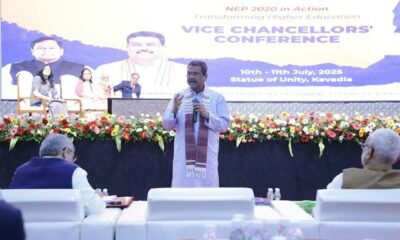

NEP 2020’s Panch Sankalpa to Guide Central Universities: Dharmendra Pradhan
-


The Woman Who Refused to Disappear – Aditi Sharma’s Quiet Fight for Education
-
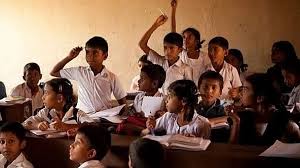

UP Govt Launches Astro Labs in Government Schools to Boost Scientific Learning
-
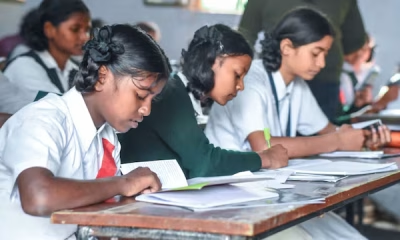

Class 3 Learning Levels Show Gains Since Pandemic, But Still Below 2017: PARAKH Survey
-


Manipur Rallies Call for Disruption-Free Education Amid Ongoing Unrest
-
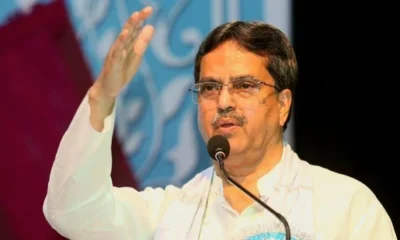

Tripura CM Launches School Framework, Stresses Social Work in Education
-


“We Sleep on Walls Here”: Shubhanshu Shukla Talks to Indian Students from Space
-


A Structural Proposal to Transform School Education in Bihar
-
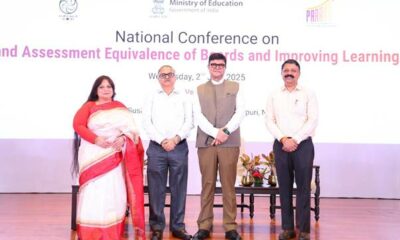

National Conference Pushes for Common Standards Across School Boards
-
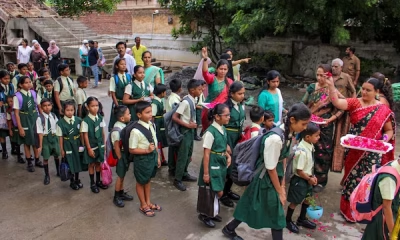

Maharashtra: Over 8,000 Villages Lack Schools, CCTV Compliance Still Patchy
Education
No More Backbenchers: How a Simple Seating Shift Is Reimagining Learning
Published
22 hours agoon
July 11, 2025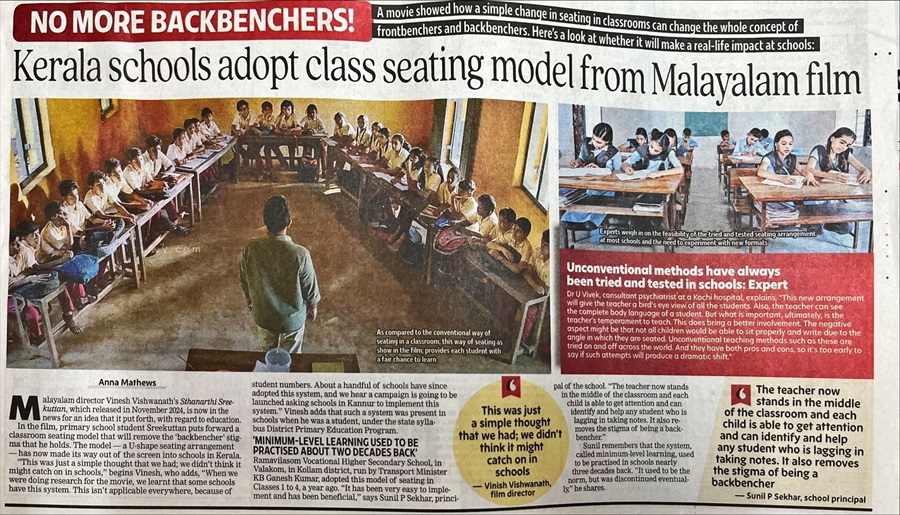
When was the last time you thought about where your students sit? If you think a seat is just a seat — think again.
A simple shift in seating arrangements, sparked by the Malayalam film Sthanarthi Sreekuttan, is inspiring schools in Kerala to break the age-old divide of “frontbenchers” and “backbenchers”. The Times of India recently reported how some schools have begun rethinking how rows of benches shape mindsets — often turning bright learners into passive listeners by default.
Preethi Vickram, Founder of Tapas Progressive Learning, applauded this unique approach online:
The truth is, classroom seating is more than furniture. It’s a mirror of our teaching philosophies. For decades, rigid rows have told students to sit down, face forward, and stay quiet while the teacher talks. One person speaks, everyone else absorbs. But learning doesn’t work in a straight line — it happens in loops, debates, disagreements, and those random questions that make everyone think.
It’s not just an emotional idea — there’s solid science behind it. A 2020 review in Frontiers in Psychology found that classroom layouts directly affect interaction and motivation. The Classroom Direct blog points out that flexible layouts foster collaboration, peer learning, and inclusivity. And a 2022 ESI Conference study noted that traditional seating can create power hierarchies where only frontbenchers thrive.
In India, we know this divide well. Backbenchers are often seen as mischievous or disinterested — but what if they were simply disengaged by design? Many schools still enforce outdated seating rules: girls must sit separately from boys; ‘weak’ students banished to the back; bright ones pushed to the front like prized trophies. But what are we telling children when we make them sit apart based on gender, marks or silence? That some voices matter more than others.
Architects and education designers have long championed a different approach. Rosan Bosch’s designs for Sweden’s Vittra School are modular and playful, showing that space itself can be a teacher. Danish Kurani, an expert in reimagining learning spaces, writes that the biggest mistake schools make is assuming they can modernise teaching methods without changing the physical space: “You can’t have collaborative, project-based learning in a classroom still set up for rows of passive listening.”
Kerala’s small but significant shift is a reminder that big change often starts with small, visible actions. When students sit in circles, clusters, or flexible pods, they are more likely to speak up, listen actively, and learn from one another. It helps break the silent stigma that ‘the back’ means you don’t matter.
Designers like Kurani argue that students should have a voice in how their classrooms look and feel — because when the space reflects curiosity and movement, it encourages the same in young minds. The Studio Schools Trust in the UK, the Reggio Emilia approach in Italy, and Big Picture Learning schools in the US all prove that flexible, student-centred learning environments are not “alternative” anymore — they’re the future.
And this shift doesn’t need fancy gadgets or big budgets. It’s the lowest-cost ‘edtech’ upgrade schools can make: moving a few benches, opening up a circle, creating nooks for quiet work and spaces for loud debate. It tells children: “Your voice matters, wherever you sit.”
In a world that needs more curiosity, connection, and creativity — we cannot afford to let seating stifle learning.
So let’s not just remove the backbenchers — let’s remove the very idea of front and back.
Because when every child feels seen and heard, there are no bad seats in the house.
References: * Classroom Direct Blog, 2021 * Frontiers in Psychology, 2020 * ESI Conference Proceedings, 2022 * Danish Kurani on Common Classroom Design Mistakes
Education
NEP 2020’s Panch Sankalpa to Guide Central Universities: Dharmendra Pradhan
Published
23 hours agoon
July 11, 2025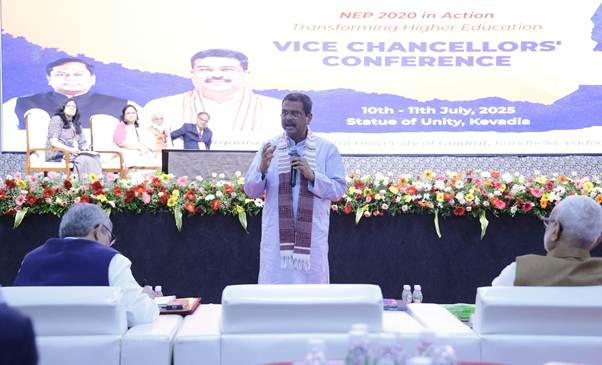
More than 50 Vice Chancellors of India’s central universities gathered in Kevadia, Gujarat for a two-day conference to assess the implementation of the National Education Policy (NEP) 2020 and lay the groundwork for the coming years. Organised by the Ministry of Education in collaboration with the Central University of Gujarat, the conference seeks to align higher education institutions with the broader national vision of Viksit Bharat by 2047.
Union Education Minister Dharmendra Pradhan, addressing the gathering, outlined the Panch Sankalpa of NEP 2020—next-generation education, multidisciplinary learning, innovation, holistic development, and Bharatiya orientation—as the guiding principles for institutional transformation. He emphasised that India’s higher education ecosystem has undergone significant change over the last decade, becoming more flexible, inclusive, and innovation-driven. Student enrolment has increased by 30% since 2014–15 to reach 4.46 crore, with female enrolment growing by 38%. The gross enrolment ratio for female students now exceeds that of males, while enrolment among Scheduled Castes and Scheduled Tribes has also improved. PhD enrolments have nearly doubled, with women registering a 136% increase.
The Minister urged Vice Chancellors to play a transformative role by redesigning curricula, improving digital infrastructure, strengthening faculty training, and promoting multidisciplinary education. He reiterated the goal of raising the gross enrolment ratio in higher education to 50% by 2035, in line with the NEP’s vision. Placing students at the centre of all reform efforts, he called on universities to foster job creators, ethical innovators, and socially responsible graduates.
Pradhan also encouraged institutions to reflect on India’s intellectual heritage while preparing for a global future, invoking the academic “Triveni Sangamam” of celebrating the past, calibrating the present, and creating the future. He recommended that each university prepare a strategy paper to fully implement NEP 2020, incorporating Indian Knowledge Systems, digital skilling initiatives, and campus-led innovations. He proposed that such review conferences be hosted at the campus level to promote decentralised engagement and exchange of ideas.
Dr. Hashmukh Adhia, Chancellor of the Central University of Gujarat, spoke about the six principles of karmayoga and the importance of Indian knowledge systems in shaping individual and collective progress. Dr. Vineet Joshi, Secretary of Higher Education, reflected on the journey since the policy’s launch and reiterated that NEP 2020 imagines universities not as degree-granting institutions, but as ecosystems of innovation, research, and holistic development. Dr. Sunil Barnwal, Additional Secretary, underlined the foundational values of access, equity, quality, affordability, and accountability, and highlighted the importance of stakeholder partnerships in driving reform.
Prof. Rama Shanker Dubey, Vice Chancellor of Central University of Gujarat, reaffirmed that all central universities are committed to advancing the vision of Viksit Bharat through concrete, on-ground measures. The conference, spread over ten thematic sessions, includes discussions on the Four-Year Undergraduate Programme, digital tools like SWAYAM and AAPAR, university governance through SAMARTH, alignment of education with the future of work, and research and innovation frameworks such as ANRF and PMRF. Other themes include equity, internationalisation, faculty development, and the integration of Indian languages and knowledge systems.
Participating universities include Jawaharlal Nehru University, University of Delhi, Tripura University, Central University of Rajasthan, Sikkim University, and many others. The outcomes of the conference are expected to help define the next phase of NEP 2020 implementation, enabling institutions to become more responsive, inclusive, and globally competitive.
Education
Less Than Half of Indian Schools Offer Skill-Based Courses for Senior Students: NCERT Survey
Published
2 days agoon
July 10, 2025
A recent survey conducted by NCERT’s National Assessment Centre has revealed that only 47% of schools across India currently offer any skill-based courses to students in Class 9 and above. This statistic highlights a significant gap in the availability of practical, job-ready education at the secondary level—an area that India’s New Education Policy has been aiming to strengthen.
The survey also found that student enrolment in these courses is even lower. Just 29% of students in Classes 9 and above have opted for skill-based subjects, indicating the need for better awareness, guidance, and integration of these programmes into mainstream learning.
The courses that are being offered include trending and industry-relevant subjects like Artificial Intelligence, Data Analytics, Digital Marketing, and E-commerce. However, experts believe these numbers are far from adequate in a country with one of the world’s largest youth populations.
At the higher education level, there is a stronger push for integrating skills into curricula. Many skill universities now structure their programmes with a 60% to 70% skill-based component, offering students a blend of theoretical and practical knowledge designed to make them workforce-ready.
The NCERT report recommends that more schools must be brought into the fold of skill education. With the job market rapidly evolving and the demand for digital and emerging technology skills growing, strengthening school-level skill education can bridge the gap between academic learning and real-world employability.
Building robust vocational streams in schools could also help address the challenge of students dropping out after secondary education due to a lack of clear pathways into meaningful careers.
Education
The Woman Who Refused to Disappear – Aditi Sharma’s Quiet Fight for Education
Published
2 days agoon
July 10, 2025
In a quiet corner of Karnal, Haryana, Aditi Sharma runs a small school for underprivileged children. She is the founder, principal, and often, the only teacher. As a transgender woman in North India, her journey has been marked by resistance and isolation — but also by unwavering commitment. Her school may lack formal recognition or resources, but it stands as a space of learning, inclusion, and quiet resilience.
Aditi is not just the founder and principal of Haryana Public School. She is also a transgender woman who dared to imagine a different kind of North India — one where prejudice makes way for possibility, and education belongs to everyone.
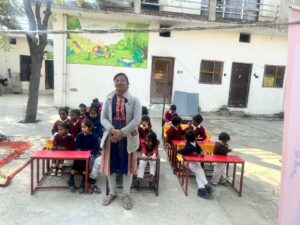
But dreams, she learned early on, come at a cost.
Born and raised in Delhi, Aditi was no stranger to the stereotypes that shadow the transgender community.
“Even educated people carry the assumption that all trans people beg or perform ceremonial rituals. That’s the stereotype I grew up seeing around me,” she says.
It disturbed her and lit the fuse of quiet rebellion.
Leaving Delhi behind, she moved to Karnal with one goal: to build a school not just for visibility, but for children who had nowhere else to go. Her father, unaware she had come out, gave her a 1,200-square-yard plot to build on. “At the time, I hadn’t fully come out. Had they known I was transgender, they wouldn’t have named it to me.”
What she built wasn’t just a school — it was a statement.
In the beginning, there were no teachers, no steady funds, and no blueprint. “I doubted whether I could run a school at all. I had no confidence. But slowly, a few children started coming in. Then a few more. At one point, we had 60–70 students.”
That number dropped, not due to a lack of dedication, but constant harassment. Neighbours let their dogs loose outside. Parents were warned, “Why send your child there? This isn’t a real school.” Some believed her identity disqualified her from leadership, from teaching, from existing with dignity.
She persisted anyway.
Aditi never set out to run a school for underprivileged children. It wasn’t a strategic choice or a targeted mission. It was simply what remained when everyone else walked away. Families who could afford higher fees refused to send their children to a school run by a transgender woman. Teachers quit under social pressure. So she opened her doors to those who had nowhere else to go — children whose families could pay ₹100 a month, sometimes just ₹50, and often nothing at all. “If they don’t learn here, they won’t learn anywhere,” she says. And so she teaches — not because it’s easy, but because no one else will.
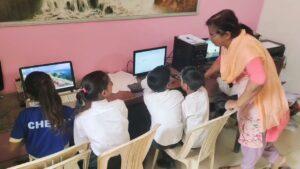
Her day begins at 4 AM — cleaning, prepping, sourcing supplies. By 8 AM, she’s teaching English, guiding students through computing tasks, or painting with them on borrowed desktops. She buys second-hand books herself. There are no permanent staff members. Most teachers leave within weeks. “They say, ‘My family doesn’t want me working here.’ The social pressure is immense.”
Once, a neighbour handed her a one-day-old baby and walked away. Aditi cared for her. When the child fell ill, she spent 12 days at the hospital with her — and the other children. Alone. “They don’t speak to me anymore,” she says of her family. “I’ve learned to let go. If someone doesn’t want to stay in touch, that’s okay. You still have to be happy.”
Haryana Public School is still not recognised by the state government. Despite its large plot, authorities claim she doesn’t meet the criteria. “Other schools on smaller land get recognised,” she says. “But because I’m transgender, they say no.” Her case is currently being reviewed by the Human Rights Commission. Justice Lalit Batra, in a hearing, reportedly said:
“If she doesn’t meet your current rule, change the rule.”
Meanwhile, the children continue to learn — with donated books, basic tools, and the irrepressible will of one woman. Aditi has even built two giant model airplanes — one stretching 20 feet — from scrap and wood. “They don’t fly, but they spark curiosity. Ten children can sit inside. It makes them dream.”
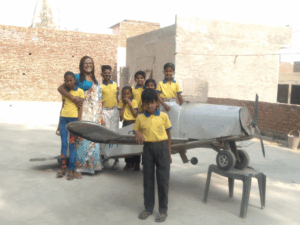
And dreams are something she insists on, even when the world offers no applause. “One child had developmental issues. No school would take him. People told me I was wasting my time. But he deserved a chance.”
Sometimes, appreciation is scarce. Respect even more so. “When parents don’t respect you, neither do their children,” she admits. “When your own life is a constant struggle, it becomes hard to build emotional bonds.”
But she still shows up every day. Reporters ask why so many people visit her school. “Because we’re doing something that shakes the norms,” she tells the children. “This school is special.”
And they believe her. Because children don’t discriminate. Adults do.
Her message to the transgender community is clear:
“Don’t wait for society to accept you. Build your own path. Even if you’re the only one walking it.”
Aditi Sharma may be the only openly transgender woman in North India running a school. But she’s not asking for sympathy. Just space. Just dignity. Just the right to show up — and not disappear.
“Even if only one child comes,” she says,
“I’ll keep the doors open.”
Read the full story in our latest Teacher Warriors issue: https://scoonews.com/magazines/scoonews-june-july-2025-digital-edition/
Education
A Vision Beyond Sight – How Aarti Takawane is Rewriting Futures for Blind Girls
Published
3 days agoon
July 9, 2025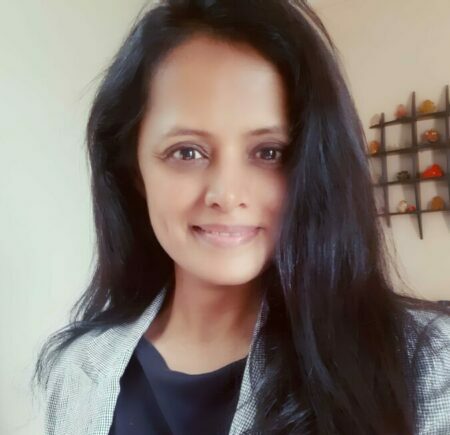
Sometimes, the most extraordinary journeys begin with an ordinary restlessness — that nagging sense that comfort isn’t enough. For Aarti Takawane, that quiet realisation led her to walk away from a secure corporate job, and towards a mission she never imagined for herself.
Aarti’s early career looked like everything most people might aspire to: a steady job, good salary, and the kind of stability that makes parents proud. But deep down, she felt a pull that numbers and meetings just couldn’t satisfy. With a background in psychology and a genuine desire to help others, she always knew her purpose lay in people, not just profit.
That spark turned into a flame when she met Mrs Meera Badve, founder of Niwant, an organisation supporting blind students in higher education. A casual encounter at a social event became a life-changing conversation. Aarti took a leap of faith and began volunteering at Niwant — and for the first time, she felt what it was like to make an impact where it truly mattered.
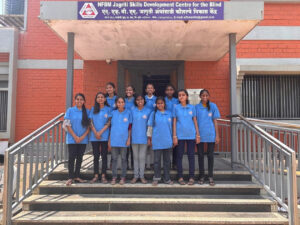
Her path eventually led her to the National Federation of the Blind’s Jagriti School for Blind Girls in Pune — a place that today houses 110 blind girls, 99% of whom come from rural areas. Here, the girls don’t just study; they live, learn, and grow together in an environment that believes in what they can do, rather than what they can’t.
When Aarti joined Jagriti, she began as a psychologist, focusing on the social and emotional development of the girls. But the more she listened to their dreams and struggles, the more she saw the barriers waiting for them after school. “When you give them the right tools, you’re not just giving them a skill — you’re giving them back their choice,” she reflects.
Visually-challenged girls face a stark reality once they step out into the world. Apart from limited government quota jobs in banks or insurance, there were few opportunities that truly matched their abilities. So, Aarti decided to do something about it.
“True empowerment means they can live with dignity, not just survive.”
She founded the Skill Development Centre inside Jagriti School — a space where blind girls could learn practical, job-ready skills that tap into their real strengths. Many of the students have remarkable listening and verbal abilities. So the Centre offers courses that play to these strengths: voice modulation, foreign languages, recruitment training, and more. There are also classes in computer literacy, digital accessibility testing, and even coaching for competitive exams.

But the real magic lies in how the Centre stays rooted in reality. The team works closely with organisations like Vision-Aid India and inclusive employers to keep training aligned with what the industry actually wants. Each student’s strengths and interests are mapped out with care, so the training feels personal and purposeful.
Equally important is what happens beyond the classroom. Many girls arrive at Jagriti shy, anxious, or unsure of themselves. They may have never used a screen reader, travelled alone, or spoken up in public. So the Centre pairs technical skills with confidence-building: mobility training, decision-making workshops, life skills, and emotional support.
“They didn’t need sympathy — they needed direction, support and opportunity,”
Funding is always a tightrope act — a mix of donations, CSR partnerships, and the occasional government grant keeps the Centre alive. It covers trainer salaries, hostel facilities, assistive technology, and learning materials. The school is committed to full transparency with its supporters, many of whom return year after year because they can see exactly where their help is going.

Aarti knows that none of this would be possible without the right people leading the way. Every teacher or trainer goes through orientation in assistive technology and inclusive education. Sensitisation workshops and regular feedback from students make sure the environment stays supportive and respectful.
As the world changes, so do Aarti’s dreams for the Centre. She hopes to introduce advanced digital modules, remote work training, and a stronger network of inclusive employers. But what excites her most is the chance to rewrite how society sees disability, not as a barrier, but as a different kind of potential waiting to be unlocked.
For the 110 girls who call Jagriti School home, Aarti Takawane is more than just a teacher. She’s proof that sometimes, the best things really do happen by accident — and that true vision is not about what we see, but what we choose to do about what we can’t.
Read the full story in our issue of Teacher Warriors 2025 at https://scoonews.com/magazines/scoonews-june-july-2025-digital-edition/
Education
UP Govt Launches Astro Labs in Government Schools to Boost Scientific Learning
Published
4 days agoon
July 8, 2025
Under the leadership of Chief Minister Yogi Adityanath, the state is rolling out astro labs in government schools at the block level, aiming to strengthen scientific thinking and curiosity among school children, especially in rural areas.
According to a statement issued by the government, these labs—named Amrit Kaal Learning Centres—are being developed through a public-private partnership (PPP) model and are already operational in several districts.
The initiative is designed to give students access to real-time, hands-on learning experiences using tools like Dobsonian telescopes, VR headsets, microscopes, light experiment kits, and anatomical models. These tools go beyond textbook learning, allowing students to explore astronomy, gravity, light, and the physical world through direct experimentation.
Officials say the initiative has already made significant impact. In Ballia district, for example, science labs have been established in all 17 blocks to make science more engaging and inquiry-driven.
Ballia District Magistrate Mangla Prasad Singh said the labs are aligned with the state’s broader goal of making science accessible and meaningful. “These labs are designed to foster experiential and inquiry-based learning,” he noted.
Chief Development Officer Aojaswi Raj added that each lab costs between ₹2.5 to ₹3 lakh, including both the equipment and teacher training. The inclusion of orientation sessions, video guides, and mentorship support for teachers ensures that the labs are used effectively in classrooms.
“These labs have sparked genuine curiosity among children, who now ask questions, observe the night sky, and explore concepts far beyond the standard curriculum,” said Raj.
The program is part of a larger effort to bridge the gap between urban and rural education. With access to advanced tools and teacher support, children in villages are beginning to imagine careers in space science, inspired by stories like that of Indian-origin astronaut Shubhanshu Shukla.
The UP government hopes this initiative will help build a future-ready generation, where aspiration is not defined by geography, and the boundaries of scientific exploration begin right from the classroom.
Education
Class 3 Learning Levels Show Gains Since Pandemic, But Still Below 2017: PARAKH Survey
Published
4 days agoon
July 8, 2025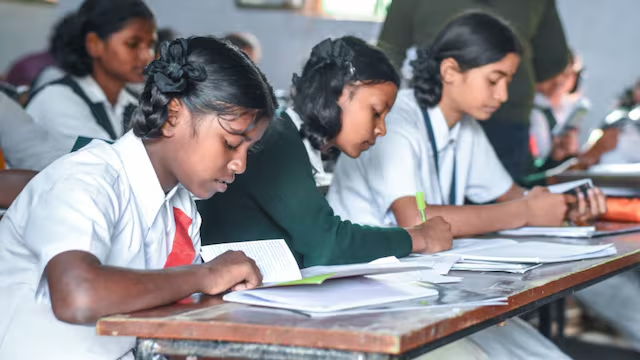
According to the government’s latest PARAKH Rashtriya Sarvekshan report released on Monday, Class 3 students across India have yet to return to pre-COVID academic levels. The survey, conducted in December 2024, covered more than 21 lakh students from Classes 3, 6, and 9 across 74,229 schools, offering a large-scale snapshot of student learning recovery after the pandemic.
Among the three grades, Class 3 is the only one surveyed in all three rounds (2017, 2021, and 2024) — allowing for direct comparison. While there has been an uptick in scores since the 2021 assessment, they remain below the national average recorded in 2017.
In 2024, Class 3 students scored an average of 64% in language, compared to 62% in 2021 — but still lower than 66.7% in 2017. In Mathematics, the score stood at 60%, up from 57% in 2021, but below the 63% recorded in 2017.
Students were found to struggle the most in reading short stories and understanding them (60%), while performing best in everyday language usage (67%). In Maths, the lowest scores came in geometry and money concepts (50%), with the strongest performance in identifying basic shapes and number patterns (69%).
The survey’s structure is aligned with the National Education Policy (NEP) 2020, which breaks school education into four key stages. Class 3 marks the end of the Foundational Stage, making it a crucial checkpoint for basic literacy and numeracy.
Classes 6 and 9: Scores Below 50% in Most Subjects
Students in Classes 6 and 9 showed average scores below 50% in all subjects except language, suggesting that older cohorts may be bearing the brunt of prolonged learning loss from pandemic-related school closures.
A senior official from the Ministry of Education noted that these grades missed nearly two full years of classroom instruction during a critical developmental period. Despite visible recovery since 2021, the learning gaps persist.
Why This Matters
The findings serve as a reminder of the lasting impact of the pandemic on India’s school education, especially for early learners. The report calls for targeted learning interventions, curriculum adjustments, and robust teacher support systems to help students recover foundational skills.
With only limited time before students transition into higher stages of schooling, the emphasis is now on accelerated catch-up strategies and deeper diagnostic assessments to address these persistent gaps.
Education
Design and the Future of Learning: How Architecture is Shaping Next-Gen Schools
Published
4 days agoon
July 8, 2025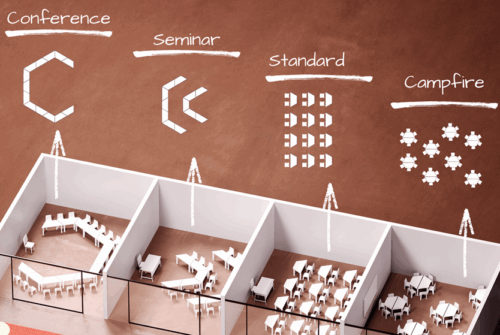
Schools Undergoing Change in India
Schools in India are undergoing a major transformation. Teaching methods are evolving, and schools must meet rising expectations from students, parents, and educators. The National Education Policy (NEP) 2020 has introduced a fresh approach to learning, making it essential for new schools to be designed with these ideas in mind. Older campuses also need thoughtful upgrades and renovations to keep pace.
Schools must adapt to stay relevant in the years ahead. Designing flexible, future-ready spaces is no longer optional, it is vital for creating learning environments that will serve new generations for decades to come.
Experiential Learning
Experiential learning is reshaping education by focusing on hands-on, experience-based learning. It encourages students to take part in activities, real-world problem-solving, and interactive projects that spark curiosity and innovation. Collaboration is central — students work together to tackle challenges, share ideas, and find solutions. This approach deepens understanding and builds teamwork and communication skills needed for future work.
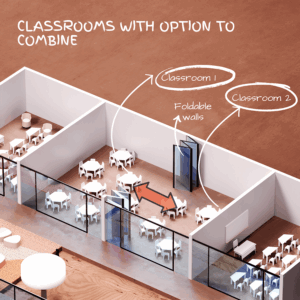
The Importance of Collaboration
Creating spaces that foster experiential learning, enhance engagement, and build critical thinking is essential. Collaborative spaces are a core part of modern school design. They encourage active learning and help students grasp concepts in a deep and meaningful way. By fostering collaboration, schools enable students to develop the skills necessary for success in a rapidly changing world.
Evolving Traditional Classrooms
Traditional classrooms are changing fast. The old rows of desks facing the teacher are giving way to flexible layouts that support different ways of learning. Today’s classrooms can easily switch between standard seating for lectures, conference-style setups for group work, seminar formats for presentations, or campfire circles for open discussions.
Good spatial design plays a big role in building critical thinking and problem-solving skills. A well-designed classroom makes it easy to rearrange furniture for each activity, helping students engage more, think creatively, and learn better together. Studies show students are more motivated and focused in classrooms that adapt to different teaching styles and make learning more interactive.
Spatial Design to Encourage Collaboration
Classrooms with movable furniture allow easy reconfiguration for group work, individual study, or interactive discussions. Flexibility is crucial in modern school design, with modular furniture, movable walls, and multipurpose rooms adapting to different needs. Removing long corridors and creating learning commons with classrooms around them is another innovative approach. Classrooms can open into these commons using sliding or folding partitions, creating a cohesive learning environment. Combining classrooms allows teachers to teach multiple groups together,
building a sense of community.
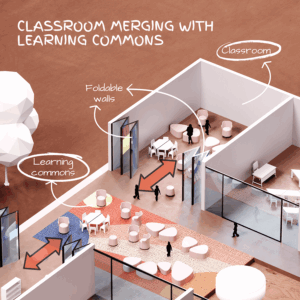
Breakout spaces offer small areas for group discussions, brainstorming, or quiet study, with comfortable seating and whiteboards. Makerspaces equipped with tools and materials foster innovation and hands-on learning by allowing students to apply theory in practice. Outdoor learning areas like gardens or amphitheaters add variety and encourage creativity. Technology-integrated spaces with interactive whiteboards and projectors enhance collaboration by making it easy for students to work together and share ideas. Learning pods provide semi-private spots for group work or individual study. Transparent walls and large windows create openness and bring in natural light, inspiring students to stay engaged.
Designing for well-being & Inclusion
Natural light, vibrant colours, and good acoustics make learning spaces more engaging. Inclusivity is essential so that diverse needs and abilities are accommodated, ensuring all students can succeed. Cross ventilation, thermal comfort, and indoor air quality are equally important — they improve physical comfort and well-being, helping students focus better.
Creativity is also key in effective learning spaces. From preschools to K-12, classrooms should inspire imagination and encourage students to think beyond the ordinary. Thoughtful design elements help create environments where curiosity and innovation thrive.

Conclusion
The future of learning will continue to evolve, but well-designed spaces will always play a central role. As educators and designers, we have a unique responsibility to create environments that inspire curiosity, spark ideas, and
support every learner’s journey. By designing schools that are flexible, inclusive, and future-ready, we build not just better classrooms but a stronger foundation for generations to come.
This article is authored by Vinod and Ranju Singhi, the Co-Founders and Principal Architects of BASICS Architects.
Education
Punjab to Introduce Business, Marketing Education in Govt Schools for High Schoolers
Published
5 days agoon
July 7, 2025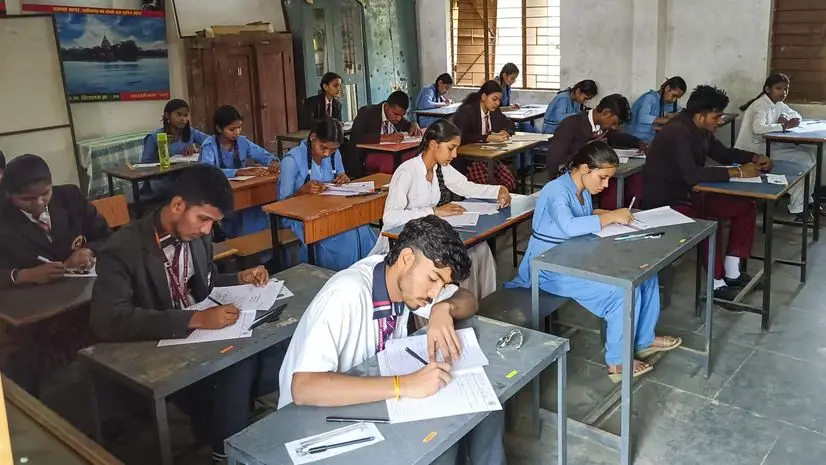
The Punjab government has announced that all Class 11 and 12 students in government schools will receive skill education in business and marketing from the upcoming academic session. The initiative is being implemented under the Punjab Young Entrepreneurs Scheme.
According to Education Minister Harjot Singh Bains, the programme aims to introduce basic entrepreneurship concepts to senior secondary students. As part of this, students will be required to develop and present business ideas as subject-linked projects. The state has also invested in setting up innovation labs in schools to support product development and technical training.
The initiative was formally presented at the Business Blasters Expo 2025, where student teams from various districts showcased business models to a panel of educators, industrialists, and startup professionals. According to official information, participating teams received financial support to take their ideas forward.
Some of the student-led projects included products such as handmade goods, natural cosmetics, customised simulators, framed artwork, and cycle-based mobility solutions. In one case, a student from Mullanpur Dakha created decorative items that were later sold in the market at a significantly higher margin.
The Education Minister also cited employment data between 2014–15 and 2021–22, pointing to a gap between job applicants and job placements. The scheme, he said, is being introduced with the aim of equipping students with skills relevant to today’s economic landscape.
Initially piloted in 30 schools, the Punjab Young Entrepreneurs Scheme is now being scaled across the state. The business and marketing module is expected to cover financial literacy, product development, market analysis, and customer outreach.
The government has stated that the curriculum will align with academic requirements while also supporting practical exposure. Further partnerships with technical institutions and industry stakeholders are also being explored.
Education
Manipur Rallies Call for Disruption-Free Education Amid Ongoing Unrest
Published
5 days agoon
July 7, 2025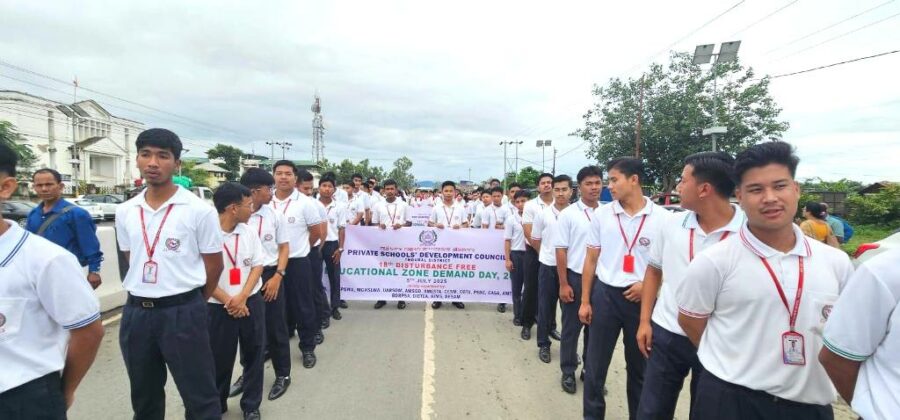
Thousands of voices echoed across the valley districts of Manipur on 5th July, as students, teachers, and civil society members marched in unison, demanding an uninterrupted and safe educational environment. Marking the 18th Disturbance-Free Education Zone Demand Day, the rallies were spearheaded by the Democratic Students’ Alliance of Manipur (DESAM), with support from over 15 civil society organisations.
Held across Imphal East, Imphal West, Kakching, Thoubal, and Bishnupur, the rallies were unified under the message: “Make Education a Disturbance Free Zone.” From THAU Ground near the Legislative Assembly to Imphal College, and similar routes in other districts, demonstrators walked with banners, placards, and resolute slogans calling for peace and protection of learning spaces.
This year’s observance comes at a particularly sensitive moment for the state, as Manipur continues to reel from over two years of ethnic conflict, political instability, and administrative disruptions. These challenges have had a disproportionate impact on the state’s education system—schools in conflict zones have been intermittently closed, exams postponed, and many children displaced from both their homes and classrooms.
Speaking to the media during the rally, DESAM President Mayengbam Somorjit urged the government to pass legislation mandating a minimum of 220 academic days per year, to ensure stability and learning continuity even during crises. He emphasized that children in Manipur must not be deprived of their right to education because of circumstances beyond their control.
Other demands included the appointment of Directors of Education from among experienced educators, and greater transparency in recruitment and promotion processes within the education department. There were also strong appeals to armed groups to abstain from placing financial or material demands on educational institutions—a practice that has led to school closures and security concerns in the past.
The rallies were largely peaceful and drew significant participation from both urban and rural communities. Protesters stressed that beyond political resolution, restoring education must become a humanitarian priority.
In the past two years, students in conflict-affected districts have faced regular school closures, sporadic internet blackouts, and mental health challenges, as families grapple with violence, displacement, and uncertainty. NGOs and local educators have warned of rising dropout rates, learning loss, and a deepening digital divide—especially in remote or vulnerable communities.
While the larger political crisis in Manipur continues to seek resolution, the message from students and educators is clear: education must be safeguarded. As one banner read during the march: “Books, not bullets. Peace, not pauses.”
Newsletter

No More Backbenchers: How a Simple Seating Shift Is Reimagining Learning

NEP 2020’s Panch Sankalpa to Guide Central Universities: Dharmendra Pradhan

Less Than Half of Indian Schools Offer Skill-Based Courses for Senior Students: NCERT Survey

The Woman Who Refused to Disappear – Aditi Sharma’s Quiet Fight for Education

A Vision Beyond Sight – How Aarti Takawane is Rewriting Futures for Blind Girls

UP Govt Launches Astro Labs in Government Schools to Boost Scientific Learning

Class 3 Learning Levels Show Gains Since Pandemic, But Still Below 2017: PARAKH Survey

Design and the Future of Learning: How Architecture is Shaping Next-Gen Schools

Punjab to Introduce Business, Marketing Education in Govt Schools for High Schoolers

Manipur Rallies Call for Disruption-Free Education Amid Ongoing Unrest

Tripura CM Launches School Framework, Stresses Social Work in Education

“We Sleep on Walls Here”: Shubhanshu Shukla Talks to Indian Students from Space

A Structural Proposal to Transform School Education in Bihar

NIIT Foundation and YuWaah, UNICEF Launch Free Online Digital Marketing Course for Youth

National Conference Pushes for Common Standards Across School Boards

Maharashtra: Over 8,000 Villages Lack Schools, CCTV Compliance Still Patchy

Haryana to Offer Free After-School Coaching for JEE, NDA Aspirants

Telangana CM Calls for Overhaul of Intermediate Education in Telangana

Indian Astronaut Shubhanshu Shukla to Connect with School Students Live from Space

Are 4-Year Degrees Dead? Nikhil Kamath and the WEF Say Lifelong Learning Is Here to Stay

UGC Cracks Down on 89 Institutes Over Anti-Ragging Failures

Government Doubles Down on Coaching Centres: New Panel Signals Stronger Regulation Ahead

CBSE To Conduct Board Exams Twice for Class 10 from 2026

How to Win Back Wandering Minds: Post-Summer Edition
Tripura Becomes Third Indian State to Achieve Full Literacy

CBSE’s ‘Sugar Boards’ Initiative: Tackling the Sweet Crisis in Indian Schools

Is Your School Following These Mandatory CBSE Committees?

Maharashtra to Regulate Pre-Primary Education with New Law Aligned to NEP 2020

MAHAJYOTI’s Book Distribution Scheme to Empower 7,000 OBC Students Preparing for JEE/NEET & MHT-CET

China Embarks on Ambitious AI-Driven Education Reform to Build a ‘Strong Education Nation’ by 2035

John King’s Book ‘Teacher By Teacher’: A Global Tribute to the Transformative Power of Education

CBSE Introduces Mandatory Bridge Course for Classes 6 to 12 in Chhattisgarh Under NEP 2020

Rewriting Ambedkar: Why Students Must Know the Man Beyond the Constitution

CBSE Mandates 50-Hour Annual Training for Teachers, Declares STEM as 2025 Theme

Banu Mushtaq’s International Booker Win Is a Wake-Up Call for Indian Schools to Reclaim Literature

India Bids Farewell to NEP Architect Dr K. Kasturirangan

Pradhan Mantri Rashtriya Bal Puraskar 2025: Nominations Now Open for India’s Young Achievers

NCERT Class 7 Textbooks Updated: Mughals Removed, Focus on Indian Ethos and Pilgrimage

Delhi Government Cracks Down on Dummy Schooling; Over 600 Schools Inspected, 10 Issued Notices

Delhi Approves Landmark Bill to Regulate School Fees Across 1,677 Institutions

Harvard Stands Its Ground: Harvard Faces ₹18,400 Crore Funding Freeze After Rejecting Trump Administration’s Demands

Operation Sindoor and Operation Abhyaas: Navigating School Safety and Student Well-being Amid Rising Tensions

CUET-UG 2025 Likely to be Postponed, Fresh Dates Expected Soon

Aalamaram 2025: Where Indian Educators Came Together to Grow, Reflect, and Lead

Trump Signs Executive Order to Promote AI Integration in U.S. K-12 Education

Mizoram Declared First Fully Literate State in India

Indian Students Flock to Singapore, Ireland, and Dubai for Higher Studies: 38% Surge Recorded

OpenAI Academy Launches in India to Democratise AI Education for Students, Teachers, and Startups

UK’s New Immigration Rules: What They Mean for Indian Students

Private School Fees Surge by 50–80% in Three Years, National Survey Finds
SGEF2023 | Special Address by Rama Datt, Trustee, Maharaja Sawai Man Singh II Trust, Jaipur

ScooNews | After Movie | ScooNews Global Educators Fest 2023

Aftermovie | NIES2 UP Chapter | 21 Jan 2023

WEBINAR | Gamification in Education: How Digital Badges Can Boost Student Motivation and Engagement

ScooNews | WEBINAR| Importance of Physical Activity for Children at School | Plaeto

SCOONEWS | WEBINAR | WHY DIGITIZING YOUR SCHOOL IS A MUST | TEACHMINT

Keynote Address | Lakshyaraj Singh Mewar

Anurag Tripathi, Secretary, CBSE at SGEF2022

How schools can nurture every student’s genius

Aftermovie | SGEF2022 | Jaipur

Li Andersson | Minister of Education | Finland

Anurag Tripathi, Secretary, Central Board of Secondary Education (CBSE) discusses NEP2020

ScooNews | Early Ed Asia 2019 | Aftermovie
#PodarECEconf : Pursuing quality ECE

#CBSE Class XII #Results #Highlights

The interesting story of India’s educational system | Adhitya Iyer

A young scientist’s quest for clean water

The Danger of Silence: Clint Smith

National Digital Library of India is an initiative by HRD Ministry

Remembering Kalpana Chawla on her birthday!

Message from Sadhguru for Students!
Message from Sadhguru for Students!

The Untapped Genius That Could Change Science for the Better

Eddy Zhong: How school makes kids less intelligent TEDxYouth@Beacon

#TEDxCanberra : What if every child had access to music education…
Trending
-

 Education2 months ago
Education2 months agoCBSE’s ‘Sugar Boards’ Initiative: Tackling the Sweet Crisis in Indian Schools
-
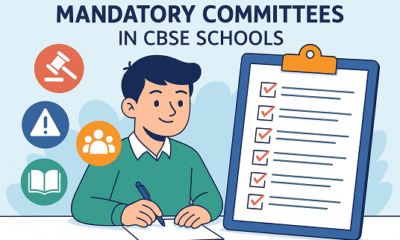
 Education3 months ago
Education3 months agoIs Your School Following These Mandatory CBSE Committees?
-
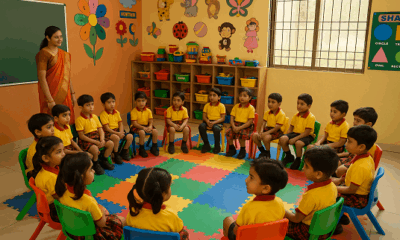
 Education3 months ago
Education3 months agoMaharashtra to Regulate Pre-Primary Education with New Law Aligned to NEP 2020
-

 Education3 months ago
Education3 months agoMAHAJYOTI’s Book Distribution Scheme to Empower 7,000 OBC Students Preparing for JEE/NEET & MHT-CET
-
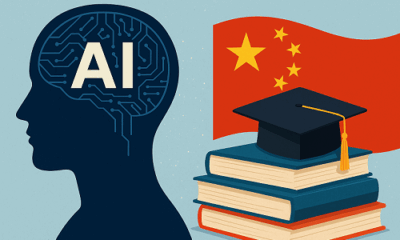
 Education3 months ago
Education3 months agoChina Embarks on Ambitious AI-Driven Education Reform to Build a ‘Strong Education Nation’ by 2035
-
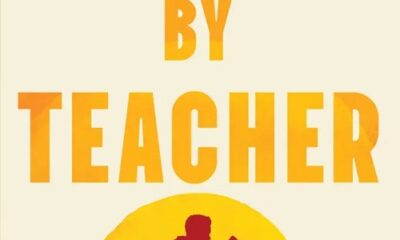
 Education2 months ago
Education2 months agoJohn King’s Book ‘Teacher By Teacher’: A Global Tribute to the Transformative Power of Education
-
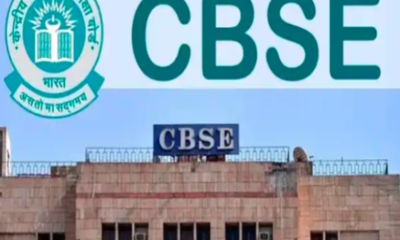
 Education3 months ago
Education3 months agoCBSE Introduces Mandatory Bridge Course for Classes 6 to 12 in Chhattisgarh Under NEP 2020
-
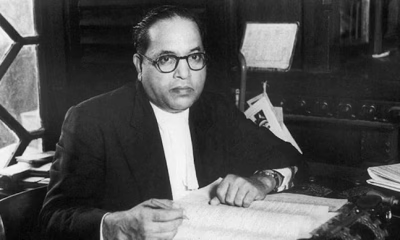
 Education3 months ago
Education3 months agoRewriting Ambedkar: Why Students Must Know the Man Beyond the Constitution
-
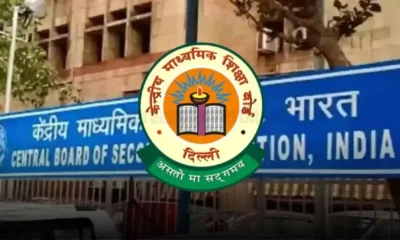
 Education3 months ago
Education3 months agoCBSE Mandates 50-Hour Annual Training for Teachers, Declares STEM as 2025 Theme
-
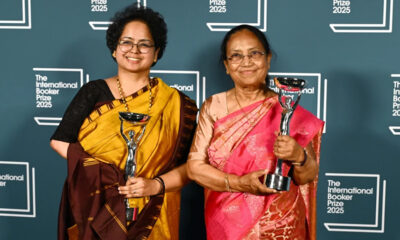
 Education2 months ago
Education2 months agoBanu Mushtaq’s International Booker Win Is a Wake-Up Call for Indian Schools to Reclaim Literature




